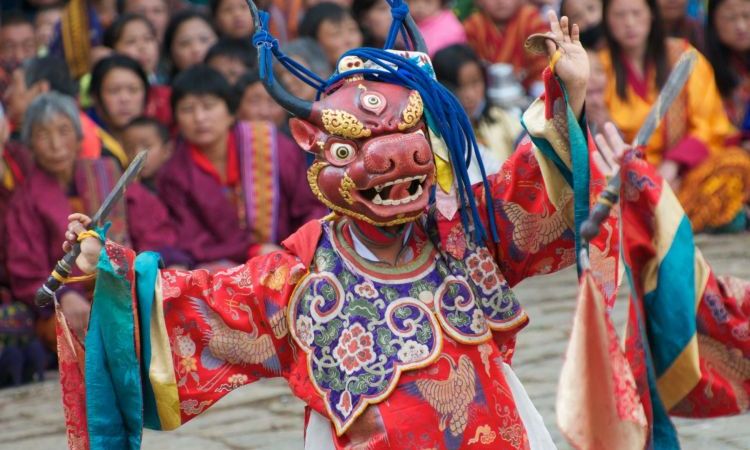A Canadian's Guide to Bhutan's Hidden Gems

Introduction to Bhutan
Overview of Bhutan
Bhutan, a small landlocked country nestled in the Eastern Himalayas, is renowned for its stunning landscapes, vibrant culture, and unique approach to measuring national success through the concept of Gross National Happiness (GNH). With a population of around 800,000 people, Bhutan is known for being one of the happiest countries in the world, despite not having a high GDP.
The country's commitment to environmental conservation is evident in its constitution, which mandates that at least 60% of the land remains under forest cover for all time. Bhutan's tourism is regulated through a "high-value, low-impact" policy, ensuring that tourism benefits both visitors and the local population while preserving the country's natural beauty.
Cultural Significance
Bhutan's rich cultural heritage is deeply intertwined with Buddhism, which plays a central role in the daily lives of its people. The country is dotted with majestic Buddhist monasteries, known as dzongs, that serve as religious and administrative centres. Festivals such as the vibrant Paro Tsechu and Thimphu Tshechu showcase traditional mask dances, music, and rituals that have been passed down through generations.
Bhutanese architecture, characterized by colourful hand-painted motifs and intricately carved woodwork, reflects the country's artistic prowess and attention to detail. The national dress, known as the gho for men and kira for women, is worn with pride and symbolizes Bhutanese identity and tradition. With a focus on preserving its cultural heritage, Bhutan offers a glimpse into a way of life that is deeply rooted in tradition and spirituality.

Planning Your Trip to Bhutan
Visa and Entry Requirements
If you are considering a trip to Bhutan, it is important to note that obtaining a visa is mandatory. All tourists, except for Indian, Bangladeshi, and Maldivian passport holders, must apply for a visa through a licensed tour operator in Bhutan. The visa processing fee includes a daily tariff set by the government, ensuring sustainable tourism practices in the country.
Additionally, travellers should hold a passport valid for at least six months beyond their intended departure date from Bhutan. It is advisable to plan your trip well in advance to avoid any last-minute visa-related complications.
Best Time to Visit
While Bhutan is a year-round destination, the best time to visit largely depends on your preferences and interests. The peak tourist seasons in Bhutan are spring (March-May) and autumn (September-November), when the weather is pleasant, and the valleys are adorned with blooming flowers or vibrant autumn colours. These seasons are ideal for trekking, exploring cultural sites, and attending local festivals. If you prefer fewer crowds and are interested in witnessing Bhutan's winter landscapes, visiting during the winter months (December-February) can offer a unique and tranquil experience.
However, be prepared for cold temperatures and limited access to high-altitude regions due to snowfall. Summer (June-August) is the monsoon season, bringing lush greenery but also occasional rainfall, making it a less popular time to visit. Choose the time that aligns with your travel preferences to make the most of your visit to the Land of the Thunder Dragon.
Exploring Bhutan's Natural Wonders
Hiking Trails
When in Bhutan, nature enthusiasts are in for a treat with the extensive network of hiking trails that offer breathtaking views of the Himalayas, dense forests, and pristine landscapes. Whether you are an experienced hiker or a beginner, there are trails suitable for every skill level. The popular Tiger's Nest Trail, leading to the iconic Taktsang Monastery perched on a cliff, is a must-do for adrenaline junkies and spiritual seekers alike.
For those seeking a more immersive experience, the Druk Path Trek, connecting Paro and Thimphu, provides a glimpse into Bhutan's diverse flora and fauna. Remember to respect the environment, stick to designated trails, and carry essentials like water, snacks, and appropriate gear to make the most of your hiking adventure.
National Parks
Bhutan's national parks are a sanctuary for diverse wildlife and serve as a vital habitat for many endangered species. The Jigme Dorji National Park, the largest protected area in the country, offers a chance to spot elusive creatures like snow leopards, Himalayan blue sheep, and takins. The Royal Manas National Park, a UNESCO World Heritage Site, boasts a rich biodiversity with tropical forests, grasslands, and riverine habitats.
Visitors can embark on guided wildlife safaris, birdwatching excursions, or nature walks to appreciate the beauty of Bhutan's natural heritage. Remember to adhere to park regulations, maintain a safe distance from wildlife, and embrace the tranquillity of these conservation areas. Immersing yourself in Bhutan's natural wonders through hiking and exploring national parks is an experience that will leave you in awe of the country's pristine landscapes and rich biodiversity.

Immersing in Bhutanese Culture
Traditional Festivals
Immersing yourself in Bhutanese culture means experiencing the vibrant and deeply rooted traditions that define the country's cultural landscape. Traditional festivals, such as the grand Tsechu celebrations held annually in monasteries and dzongs across Bhutan, offer a spectacle of masked dances, religious performances, and colourful processions.
These festivals hold significant religious and historical importance, providing a glimpse into the rich tapestry of Bhutanese heritage. Attendees can witness age-old rituals, receive blessings from monks, and partake in traditional feasting, fostering a sense of community and spiritual connection.
Cultural Heritage Sites
Exploring Bhutan's cultural heritage sites is a journey through time, unveiling architectural marvels, sacred temples, and ancient monasteries. The majestic Punakha Dzong, nestled at the confluence of two rivers, stands as a symbol of Bhutanese tradition and craftsmanship.
Paro Taktsang, also known as Tiger's Nest Monastery, perched on a cliffside, is a testament to both spiritual devotion and architectural ingenuity. Visitors can delve into Bhutan's past at the historic Kyichu Lhakhang, one of the oldest temples in the country, or witness the intricate murals at the 17th-century Gangtey Monastery. These sites offer a glimpse into Bhutan's cultural legacy, reflecting the country's unwavering commitment to preserving its heritage for future generations.

Sampling Bhutanese Cuisine
Local Dishes to Try
When immersing yourself in Bhutanese culture, sampling the local cuisine is a must. Start your culinary journey with the national dish Ema Datshi, a spicy blend of cheese and chilli peppers that packs a flavorful punch.
For a hearty meal, try Jasha Maru, a savoury chicken dish cooked with tomatoes and onions, or Suja, a traditional butter tea that warms both the body and soul. Don't miss out on momos, steamed dumplings filled with meat or vegetables, a popular snack enjoyed by locals and visitors alike.
Top Restaurants in Bhutan
Exploring Bhutan's culinary scene can lead you to some hidden gems in terms of dining experiences. Visit Bukhari at the Uma by COMO in Paro for a fine dining experience that combines local flavours with international culinary techniques.
If you find yourself in Thimphu, indulge in a meal at Ambient Cafe, known for its cosy atmosphere and delicious Bhutanese dishes. For a taste of authentic Bhutanese food in Punakha, head to Sonam Trophel Restaurant, where you can savour traditional delicacies amidst a warm and welcoming ambience. These top restaurants offer a delightful blend of flavours that will leave your taste buds wanting more.
By immersing yourself in Bhutanese cuisine, you not only get a literal taste of the country but also gain a deeper appreciation for its culture and traditions. From fiery curries to comforting soups, Bhutanese cuisine reflects the essence of the nation's heritage and the warmth of its people. So, savour each bite and let the flavours transport you to the heart of the Himalayas.
Experiencing Bhutan's Spiritual Side
Visiting Monasteries
As you delve deeper into the heart of Bhutan, exploring its spiritual side is an essential part of the journey. The country is dotted with numerous monasteries, each with its unique charm and significance. A visit to the iconic Tiger's Nest Monastery, perched precariously on a cliffside, offers not only breathtaking views but also a sense of peace and tranquillity.
Alternatively, immerse yourself in the serene atmosphere of Punakha Dzong, a majestic fortress monastery located at the confluence of two rivers. These sacred sites provide a glimpse into Bhutan's rich religious heritage and offer a moment of reflection amidst the stunning natural beauty.
Meditation Retreats
For a more immersive spiritual experience, consider embarking on a meditation retreat during your stay in Bhutan. The country's pristine environment and tranquil surroundings make it an ideal setting for introspection and mindfulness. Dive deep into the practice of meditation under the guidance of experienced teachers at one of Bhutan's secluded retreat centres.
Whether you are a seasoned practitioner or a beginner, the peaceful ambience of these retreats will allow you to reconnect with yourself and find inner harmony. Embark on a journey of self-discovery and spiritual awakening as you tap into the ancient wisdom that permeates Bhutan's spiritual landscape. By aligning your culinary exploration with deep spiritual experiences, your trip to Bhutan becomes a holistic immersion into the soul of the Himalayas.
From savoring the flavors of local delicacies to finding inner peace in the midst of sacred monasteries, Bhutan offers a transformative journey that nourishes both body and soul. Embrace the spiritual essence of this enchanting land and uncover the secrets that lie within its rich tapestry of tradition and spirituality.

Shopping for Souvenirs in Bhutan
Handicrafts and Textiles
When in Bhutan, shopping for souvenirs is a delightful way to bring a piece of this enchanting kingdom back home with you. Handicrafts and textiles are among the most popular items sought after by visitors.
Explore the vibrant markets and local shops to discover intricately woven textiles, colourful handwoven fabrics, and beautifully crafted wooden products. The artistry and craftsmanship displayed in Bhutanese handicrafts are a testament to the country's rich cultural heritage.
Traditional Bhutanese Products
Immerse yourself in Bhutan's unique culture by shopping for traditional Bhutanese products. From exquisite hand-painted thangkas depicting religious scenes to intricately designed prayer flags that symbolize peace and harmony, the traditional products available make for meaningful souvenirs.
Don't miss the opportunity to purchase Bhutanese ceramics, bamboo crafts, or intricate handmade jewellery that reflects the essence of Bhutan's artistic traditions. Exploring the local markets and boutiques not only allows you to acquire authentic Bhutanese souvenirs but also provides insight into the country's artistic heritage and skilled craftsmanship.
Whether you are drawn to the vibrant colours of Bhutanese textiles or the intricate details of traditional crafts, each souvenir tells a story of Bhutan's cultural wealth waiting to be shared with the world.
Practical Tips for Travelling in Bhutan
Transportation Options
While in Bhutan, it's essential to be aware of the transportation options available to navigate this beautiful kingdom. The most common way to travel around Bhutan is by hiring a car with a driver. This allows for flexibility in exploring various attractions at your own pace. Taxis are also available in urban areas, but make sure to agree on fares beforehand or ask the driver to use the meter.
For those seeking a more adventurous experience, local buses offer a budget-friendly mode of transportation, albeit with less comfort and reliability. Additionally, trekking enthusiasts can opt for trekking tours that provide a unique way to experience the stunning landscapes of Bhutan on foot.
Etiquette and Customs
Understanding the etiquette and customs in Bhutan is crucial to ensure a respectful and enjoyable journey. Bhutanese people greatly value respect and politeness, so remember to greet locals with a "Kuzuzangpo" (hello) and show appreciation for their culture.
When visiting temples, dzongs, or other religious sites, dress modestly and remove your shoes before entering. It is customary to walk clockwise around religious structures, chortens, or prayer wheels as a sign of respect. Moreover, do not point at people or religious objects, and always ask for permission before taking photographs, especially of individuals.
Additionally, avoid public displays of affection and be mindful of waste disposal by not littering in this pristine environment. By adhering to these practical tips on transportation options and understanding the etiquette and customs in Bhutan, you can make the most of your journey and immerse yourself in the unique culture and natural beauty of this enchanting kingdom.
